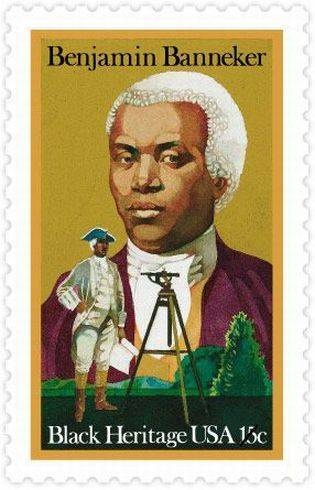Benjamin Banneker was the eldest child of a free black couple who owned a tobacco farm in Baltimore County, Maryland. Banneker was a gifted self-taught mathematician, astronomer, and farmer befriended by the family of Quaker entrepreneurs of George Ellicott.
Banneker and George Ellicott found their shared interests in mathematics and natural science brought them together as friends, and a special bond developed. In 1788, George gave Benjamin a set of astronomical instruments and four works on astronomy. George intended to instruct Banneker on using the instruments, but Banneker already figured out how to do so before George could instruct him.
Benjamin became a well-respected astronomer and developed his first almanac with accurate predictions of sunsets, sunrises, eclipses, weather conditions, and even a calculation of recurrence of locust plagues. He sent a letter to Thomas Jefferson and a handwritten copy of his almanac.
In Benjamin’s letter to Jefferson, he embraced the opportunity to eradicate the false idea that his race was doomed and not intellectually competitive to the white race. Banneker challenged Thomas Jefferson’s writings, “We hold these truths to be self-evident, that all men are created equal, and that they are endowed by their creator with certain unalienable rights, that among these are life, liberty, and the pursuit of happiness.” Benjamin asked Jefferson how he could believe this at the same time be found guilty of enslaving people.
Jefferson replied with a sincere note saying …”no body wishes more than I do to see such proofs as you exhibit, that nature has given to our black brethren, talents equal to those of the other colours of men.” Jefferson thought enough of Banneker’s work to send his almanac to the Secretary of the Academy of Sciences at Paris. Banneker’s reputation was greatly enhanced by his almanac being sent to the Academy of Sciences in Paris. Banneker was later appointed to the surveying committee to create the city plans for Washington, D.C.
As a leader of the South, Jefferson was considered in a more favorable position by blacks than other leaders of that era. However, Jefferson would much later question the idea that Banneker worked alone on his scientific work.
George Ellicott had many of Banneker’s manuscripts and intended to write Benjamin Banneker’s biography, but he did not. In addition, an arsonist destroyed Banneker’s cabin on the day of this funeral, with much of his writings and research destroyed. These two factors would have provided additional proof that Banneker did work alone.

